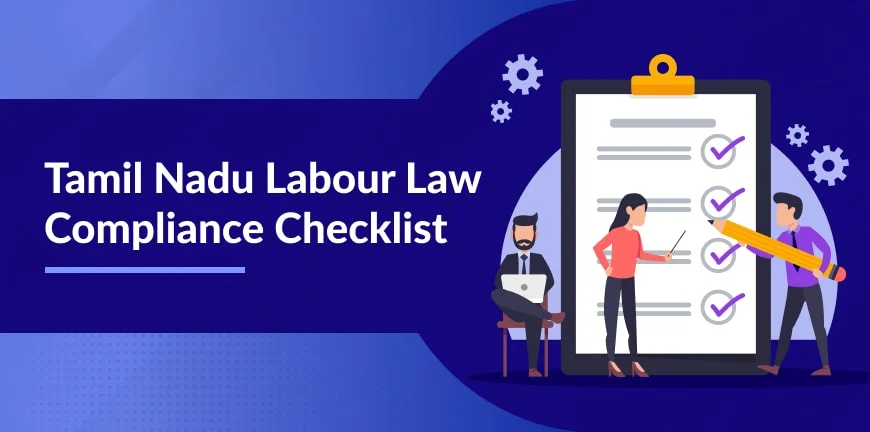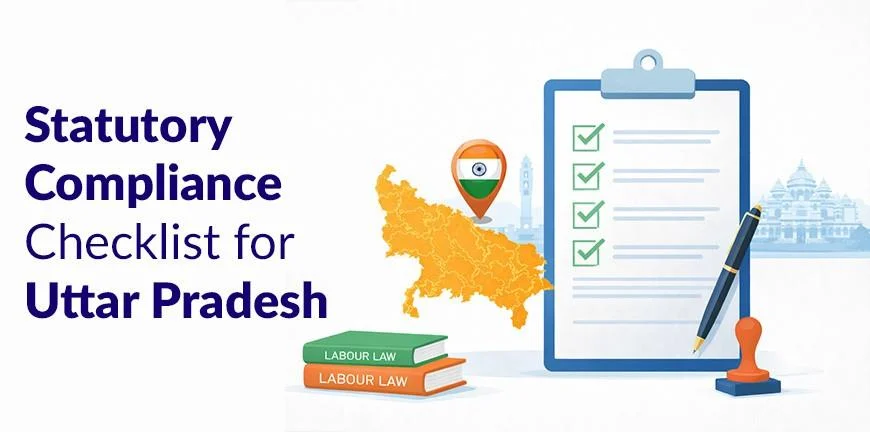
How Companies are Leveraging AI and NLP for Smart Recruitment?
08/04/2025
“Great Place to Work-Certified” Excellence Recognized!
09/04/2025Tamil Nadu has always been known for its industrial development and diverse economy. Over the past few years, the number of industries and businesses in the state has grown drastically and the need for organizations to comply with the labour laws of Tamil Nadu has become much more essential.
Before we discuss the Tamil Nadu labour law compliance checklist, that can help organizations to ensure their compliance with the applicable labour laws, let us see a little as to what exactly labour law compliance is and why it is important for organizations?
What is Labour law Compliance?
Labour law compliance in India involves ensuring that the labour laws instituted by the governing body, either centre or state, collective for the tripartite, employees, employers, and unions, are accepted and followed. It also ensures that individual labour laws are followed, which safeguard the employee’s rights at the workplace and a better work environment is maintained throughout work.
Why is Labour Law Compliance Important?
Labour laws are imposed by the state as well as the Central Government. Labour law compliance records serve as important evidence during the time of discrepancies. It is also crucial for businesses as it fosters a fair, safe, and legally sound work environment.
It not only protects the rights and well-being of employees but also safeguards businesses from legal risks, financial penalties, and reputational damage. By adhering to labour laws, organizations demonstrate ethical responsibility, enhance employee trust, and create a stable foundation for sustainable growth.
Some of the most important labour laws in Tamil Nadu that helps balance the interests of employers and employees include:
- The Trade Union Act
- The Industrial Disputes Act
- The Payment of Wages Act
- The Shops and Establishments Act
- The Factories Act
- The Employees’ State Insurance Act
- The Employees’ Provident Fund Act
- The Contract Labour Act
These laws are created to protect workers’ rights and welfare. From the formation and regulation of trade unions to the provision of medical benefits and the regulation of contract labour, these laws cover a wide range of prominent issues.
Tamil Nadu Labour Law Compliance Checklist
There are a set of labour laws organizations must maintain compliance with, in order to run their businesses legally in Tamil Nadu. Following the compliance checklist will help organizations avoid legal issues and ensure they are adhering to all relevant labour regulations.
1. Licensing and registration
If you are starting a business in Tamil Nadu, you must register your firm within a designated time limit with the Chief of Inspector of factories and obtain a license to avoid penalties, and the applicability of the Contract Labour (Regulation and Abolition) Act, 1970, exists for establishments with 20 or more employees.
2. Record Keeping
Employment contracts must be in place for both employers and workers. It is the responsibility of the employer to ensure that the contracts comply with the Tamil Nadu Shops and Establishments Act, 1947, which regulates the employment of workers in shops and commercial establishments. Employers must also maintain records like wage registers, attendance and leave records.
3. Minimum Wages and Overtime
Employees must ensure that the employees are paid fairly by complying with Minimum Wages Act, 1948 & Tamil Nadu Rules, 1953. If an employee is working overtime, beyond their working hours, then they are to be paid a minimum wage fixed by the government as per the Act.
4. Working Hours
The number of hours an employee can work in a day and a week in factories is strictly regulated by the Factories Act, 1948, and Tamil Nadu Factories Rules 1950. Employers must comply with the Act and ensure employees are working the right amount and are also given a mandatory rest period.
5. Paid Leave and Holidays
Employees in Tamil Nadu are entitled to specific paid leave entitlements including casual and sick leave under state regulations. They are also entitled to paid holidays on national days and festival days as per the Tamil Nadu Industrial Establishments Act, 1958.
6. Employee Bonuses
The Payment of Bonus Act of 1965 provides for the payment of bonuses to workers in specific industries. Businesses must pay bonuses to eligible workers at the prescribed rate and must maintain records of the bonus paid to workers.
7. Workplace health and safety
The Factories Act and the Tamil Nadu Shops and Establishments Act also mandate that employers must provide workers with a safe and healthy working environment. They must follow all the applicable protocols regarding health and safety and provide employees with the right safety training and equipment. Organizations must also conduct regular inspections and keep firefighting equipment in good working condition.
8. Social Security Benefits
The Tamil Nadu Shops and Establishments Act, and the Employees’ Provident Fund and Miscellaneous Provisions Act mandate that employers provide their employees social security benefits such as provident fund, medical benefits, and insurance coverage. Employers must ensure that they comply with these regulations and give the necessary benefits to their employees.
The Tamil Nadu labour law regulations are comprehensive and designed to protect the rights and welfare of workers while ensuring that businesses operate within a legal framework. From the key legislative acts to compliance requirements and worker rights, understanding these laws is crucial for fostering a fair and just working environment. By staying informed about the Tamil Nadu labour law updates and adhering to these regulations, both employers and employees can contribute to a more equitable and productive workplace.
Frequently Asked Questions (FAQs)
1. What is a labour law compliance checklist?
A labour law compliance checklist is essentially a list that includes all the relevant laws and regulations a business must follow. The checklist helps businesses ensure they are adhering to all relevant employment laws and regulations, including those related to wages, working hours, workplace safety, and employee benefits.
2. Why is labour law compliance important in Tamil Nadu?
Tamil Nadu is known to be a land of industrial setups, employing thousands of workers. To ensure these workers are treated fairly and protect their rights across various industries, employers must ensure to comply with the labour laws in Tamil Nadu.
3. What is the role of HR in ensuring Tamil Nadu labour law compliance?
The HR plays a crucial role in ensuring labour law compliance as they owe the responsibility of addressing and resolving employee grievances. They must integrate Grievance redressal mechanism, ensuring employee confidentiality and resolving issues fairly. Manage industrial disputes and ensure resolutions are in line with labour laws.
4. How can businesses ensure compliance with labour laws?
Some of the steps businesses must follow to ensure compliance with labour laws are- conduct regular audits, train managers and HR teams regarding the relevant laws, have an employee agreement and handbook in place, implement clear policies and procedures, document all policies and procedures, understand which labour laws affect your business, maintain accurate records of compliance maintenance, have a legal compliance expert like Alp Consulting to help support ongoing compliance.
5. What are the most common labour law violations in Tamil Nadu?
In Tamil Nadu, the most common labour law violations include non-payment of wages, minimum wage violations, unsafe working conditions, and issues related to the termination of employment along with other common violations that include Non-compliance with the Employees’ Provident Funds and Miscellaneous Provisions Act, 1952.
Contact Us For Business Enquiry

Hariharan Iyer
Hariharan Iyer is the Vice President – Operations at ALP Consulting, bringing over 40+ years of experience in HR outsourcing and labour law compliance. He leads end-to-end HRO operations, ensuring process efficiency, statutory compliance, and seamless service delivery for clients across industries. With a strong background in labour law governance and workforce management, Hariharan plays a key role in driving operational excellence and compliance-led HR solutions at ALP Consulting.




